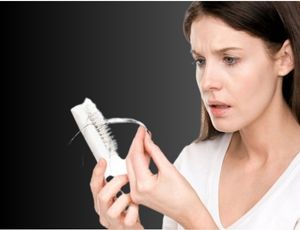


Hair loss is a common problem, especially for men, worldwide. Losing a few hairs every day is a natural process that happens to everyone, but excessive hair loss can be alarming. There are various reasons for hair loss, including malnutrition, dandruff, low protein intake, and hard water. Poor scalp health and lack of proper hair care can also contribute to hair thinning.
If you notice more hair shedding than usual, it's important to identify the underlying cause. To help with this issue, we have compiled a list of practical and effective solutions that can reduce hair fall and improve hair growth in a natural way.
Washing your hair regularly with a mild shampoo can significantly reduce the risk of dandruff, which is one of the primary causes of hair loss. Dandruff leads to an itchy, flaky scalp, which can cause irritation and hair shedding.
A gentle, nourishing shampoo helps cleanse the scalp by removing dirt, oil, and buildup while keeping the hair moisturized. It also promotes scalp health, reducing the risk of dandruff and other scalp conditions that may hinder hair growth. Additionally, it’s important to choose shampoos that are sulfate-free to prevent stripping your hair of natural oils.
Regular washing with the right shampoo can indirectly promote healthier, stronger hair and reduce hair fall.
Brushing wet hair is a common mistake that many people make, unknowingly causing damage. Hair is at its weakest when wet, and brushing it in this state can lead to excessive breakage and hair fall.
Wet hair is more elastic and prone to stretching, which makes it more susceptible to damage from forceful brushing. To avoid this, it’s recommended to wait until your hair is partially dry before brushing or use a wide-tooth comb to gently detangle.
When brushing your wet hair, make sure to start from the tips and gradually work your way up to the roots. This technique prevents unnecessary tugging and reduces the chances of breakage. Proper detangling can help maintain your hair's strength and health.
Scalp massage with essential oils is an excellent way to stimulate hair growth and reduce hair loss. Essential oils such as rosemary, lavender, and peppermint have been shown to improve blood circulation to the scalp, nourishing the hair follicles and promoting healthier hair.
Massaging your scalp not only helps distribute the oil evenly but also increases blood flow, delivering vital nutrients to the roots. Regular scalp massages can reduce stress, which is another contributor to hair loss, and promote relaxation.
For optimal results, warm a few drops of essential oil and gently massage them into your scalp for about 5-10 minutes a few times a week. This simple practice can significantly boost hair growth over time.
A diet rich in proteins, omega-3 fatty acids, and vitamins is crucial for reducing hair fall and promoting hair growth. Protein is essential for building and repairing hair follicles, while omega-3s nourish the scalp and improve the overall texture of your hair.
Incorporating protein-rich foods like eggs, fish, lean meats, beans, and nuts into your diet helps strengthen hair strands and prevent breakage. Additionally, vitamins such as vitamin A, vitamin C, and biotin play an important role in maintaining scalp health, improving circulation, and supporting hair regeneration.
Consuming a balanced diet with adequate nutrients not only boosts hair health but also enhances the overall health of your body, supporting stronger and shinier hair.
Smoking and excessive alcohol consumption have been shown to negatively impact hair growth. Smoking decreases blood circulation, which restricts the flow of nutrients to the scalp, leading to weaker hair and increased hair loss.
Alcohol, on the other hand, dehydrates the body, including the scalp, which results in dry, brittle hair that is prone to breakage. Moreover, alcohol can interfere with the absorption of important nutrients like zinc, which is vital for hair health.
Reducing or eliminating smoking and alcohol can significantly improve hair growth by promoting better circulation and providing the scalp with the necessary nutrients for healthy hair. By quitting or minimizing these habits, you will not only improve your overall health but also benefit your hair.
Hydration plays a key role in maintaining healthy hair. When your body is dehydrated, your hair becomes dry, brittle, and more prone to breakage. Water is essential for delivering nutrients to your hair follicles, keeping them hydrated and promoting hair strength.
Dehydration can also lead to a dry scalp, which can contribute to dandruff and further hair loss. It’s important to drink at least 8 glasses of water daily to keep your body hydrated and support healthy hair growth.
Additionally, hydrating your hair from the outside by using leave-in conditioners or hydrating serums can further help restore moisture. Healthy hydration supports both the scalp and the hair shaft, contributing to overall hair vitality and reducing shedding.
Excessive use of heat styling tools like hairdryers, straighteners, and curling irons can cause long-term damage to your hair. High temperatures weaken the hair cuticle, making it more likely to break and split. The damage caused by frequent heat styling can lead to dry, frizzy hair that is more prone to shedding.
To protect your hair, it’s best to minimize the use of these tools or switch to lower heat settings when styling. If you must use them, always apply a heat protectant spray to shield your hair from the damage caused by high temperatures.
Additionally, consider allowing your hair to air dry whenever possible, as this gives your hair a break from the harsh effects of heat styling tools and helps maintain its natural strength.
Stress is one of the hidden causes of hair loss that many people overlook. When you experience stress, your body produces cortisol, a hormone that can interfere with the hair growth cycle and lead to hair shedding. Chronic stress can result in telogen effluvium, a condition where hair prematurely enters the shedding phase.
Reducing stress can have a positive impact on your overall health and promote hair growth. Activities such as yoga, meditation, deep breathing exercises, or even taking regular walks can help lower cortisol levels, improve mental well-being, and reduce hair loss.
By managing stress, you can prevent its detrimental effects on your hair and foster a more balanced and healthier body.
Regular hair trims are essential for maintaining healthy hair, even though they don't directly stop hair loss. Trimming helps prevent split ends and minimizes the risk of further hair damage, making your hair appear healthier and thicker.
Cutting off damaged sections of your hair ensures that the healthy parts continue to grow without being weighed down by split ends. While trimming doesn’t affect the rate of hair growth, it does improve the overall appearance and texture of your hair.
Aim to trim your hair every 6-8 weeks to keep it looking fresh and to prevent further breakage, which can exacerbate hair loss. Regular trims support healthy hair maintenance, ultimately reducing damage and promoting growth.
Tight hairstyles such as ponytails, braids, or buns can weaken your hair over time by putting constant tension on the roots. This strain can lead to hair breakage, thinning, and traction alopecia, a form of hair loss caused by excessive pulling.
To reduce the risk of hair loss, opt for looser hairstyles that don’t pull the hair tightly at the roots. Using soft hair ties instead of elastics can also prevent unnecessary breakage.
By avoiding tight hairstyles, you can reduce the tension on your hair follicles and help maintain stronger, healthier hair. It’s important to give your scalp a break by wearing your hair down occasionally to prevent any undue stress on your hairline and roots.
Switching to a silk or satin pillowcase can significantly reduce hair breakage and minimize damage while you sleep. Traditional cotton pillowcases can create friction against your hair, causing it to become tangled and more prone to breakage.
In contrast, silk pillowcases reduce this friction, allowing your hair to glide smoothly across the fabric. Silk also helps retain moisture in your hair, keeping it hydrated and less prone to drying out overnight.
By using a silk pillowcase, you protect your hair from damage, tangling, and unnecessary breakage. This small adjustment in your routine can make a noticeable difference in the health and appearance of your hair over time.
Excessive sun exposure can lead to dry, brittle hair that is more prone to breakage. UV rays can weaken the hair shaft, causing it to lose moisture and leading to increased hair fall. To protect your hair from sun damage, wear a wide-brimmed hat or use a scarf to shield your hair from the sun.
Additionally, you can use UV-protectant hair products to help guard against the harmful effects of sunlight.
When exposed to the sun for long periods, these protective measures can keep your hair hydrated and prevent it from becoming dry and damaged. Shielding your hair from the sun not only protects its health but also helps maintain its natural shine and strength.
Chemical treatments such as bleaching, coloring, and perming can severely damage your hair, causing it to become weak and prone to breakage. These processes strip your hair of its natural oils and moisture, leaving it dry and brittle.
If you want to maintain the health of your hair, limit the use of chemical treatments or consider using natural alternatives. There are many natural hair dyes and treatments available that are less damaging to the hair structure.
Avoiding harsh chemicals ensures that your hair remains strong, healthy, and vibrant over time. By reducing chemical exposure, you can also minimize the risk of hair loss and other scalp issues caused by these treatments.
A dirty hairbrush can accumulate oils, dirt, and even old hair, which can then transfer back to your scalp, leading to hair and scalp issues. It’s essential to clean your hairbrush regularly to keep it free of buildup that could contribute to hair damage.
Cleaning your brush once a week can ensure that it remains hygienic, reducing the risk of scalp irritation and preventing hair breakage. Use warm water and mild soap to clean the bristles and remove trapped hair.
Keeping your hairbrush clean promotes a healthier scalp and helps maintain the strength of your hair. This simple maintenance task can have a significant impact on the overall health of your hair and scalp.
Adequate sleep is vital for maintaining overall health, including hair health. During sleep, the body regenerates and repairs itself, including regenerating hair follicles.
A consistent sleep schedule of 7–8 hours per night supports healthy hair growth and helps reduce hair loss. Lack of sleep can lead to increased stress, which in turn can cause hair shedding. Prioritize getting enough sleep to help your body repair and promote hair regeneration.
Creating a relaxing bedtime routine, free from distractions, can help improve sleep quality. Proper rest is essential for your overall well-being and also supports the regeneration of healthy, strong hair.